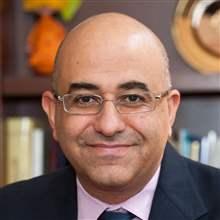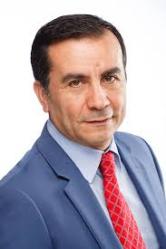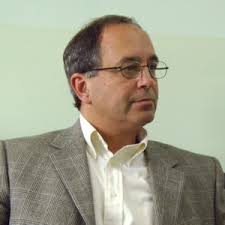Content from the Brookings Doha Center is now archived. In September 2021, after 14 years of impactful partnership, Brookings and the Brookings Doha Center announced that they were ending their affiliation. The Brookings Doha Center is now the Middle East Council on Global Affairs, a separate public policy institution based in Qatar.
The Brookings Doha Center (BDC) hosted a panel discussion on November 9, 2016, about the implications of the 2016 U.S. elections. The panelists were Khaled al-Hroub, professor in residence of the faculty of liberal arts at Northwestern University; and Joshua Mitchell, professor of political theory at Georgetown University. Samer Shehata, associate professor of the politics and international relations program at the Doha Institute for Graduate Studies, moderated the event, which was attended by members of Qatar’s diplomatic, academic, and media community.
Shehata started the discussion by inviting the panelists to remark on the surprising outcome of the elections. Mitchell noted that he was not surprised at all by Trump’s victory, as the United States has been undergoing a populist movement in reaction to decades of tension between urban and rural America. This movement is challenging an unstable post-1989 global experiment rooted in “globalization” and “identity politics.” It manifested in support not only for Trump, but also for Bernie Sanders and Brexit and in the rise of nationalist politics following the EU crisis. Mitchell argued that, far from being simply racist, Trump’s movement has important ideas stemming from a worldview that emphasizes the importance of borders, immigration policy, and national interests—as opposed to universal interests, entrepreneurship, decentralization, and the repudiation of political correctness.
He further explained that the Republican Party is not a monolith and should not be perceived as one. It has been pulled in various directions by thinkers such as William F. Buckley Jr., Edmund Burke, Frederich Hayek, John Calvin, and Thomas Aquinas, all of whom share differing viewpoints on governance. The party has been suffering from some palpable and irreconcilable fault lines since the fall of the Berlin Wall. Trump’s emergence and popularity is therefore not surprising, what is surprising is that he did not emerge sooner. In fact, Mitchell noted, the Democrats have been experiencing similar disarray, which partially explains Hillary Clinton’s loss.
Similarly, to Mitchell, al-Hroub also anticipated the result, because, he explained, polls tend to grossly underestimate support for candidates as controversial as Trump. However, he was less optimistic than Mitchell about Trump’s victory. Trumpism, which al-Hroub defined as a racist ideology that rejects political correctness, is highly troubling and has now effectively shifted from the fringes of political discourse to the mainstream, permitting politicians and laymen alike to be racist. This rhetoric will have severe repercussions, as it only serves to further marginalize minorities in the United States.
In the Middle East, al-Hroub argued, faith in the idea of democracy has eroded as a result of this U.S. election cycle; as people, in this highly distrustful and divided region, are becoming increasingly skeptical of the possibilities that can arise from a majority vote. As for projections on U.S. foreign policy towards the region, the key transformation will result from Trump’s approach to Russia. Already, we saw that Putin was the first president to congratulate Trump for his victory. The relationship between the United States and Russia will determine many global issues, as we will continue to see Russia’s renewed interest in global influence juxtaposed with American withdrawal; demonstrating particular significance in the Syrian conflict. Another important relationship to observe is that with Iran. The political landscape will transform rather drastically if Trump does decide to dismantle the nuclear deal, al-Hroub argued.
Mitchell elaborated, surmising that the relationship between Russia and the United States will be defined by realist national interest. Trump will not make democracy a prerequisite in Syria, which means that Assad will likely stay, and Russia will successfully secure a footprint in the Middle East. Trump is uninterested in nation-building, Mitchell continued, which means that he will push against an independent Kurdistan in favor of a united, federal Iraq. Finally, Mitchell argued that it is highly unlikely that Trump will be able to reinstitute sanctions on Iran.
Mitchell noted that the opposite of the current state of global involvement is not necessarily isolationism. Similarly, the opposite of free trade is not protectionism. The political elite has been unrealistic in their goals and interpretations of issues. They were under the illusion that we live in a post-war world, where the promotion of universal interests can occur without compromising national interests. As domestic concerns over the economy, unemployment, and the size of public debt exacerbate, this argument is becoming increasingly more difficult to sell. The United States will continue to be involved internationally, but allies will not enjoy its protection or support without giving something in return.
Al-Hroub stated that it is difficult to predict Trumps policies, particularly his foreign policy, because the campaign fell short of discussing issues. In the few instances where foreign policy was discussed, Trump contradicted himself, failing to present a full, coherent picture. For instance, with regard to Iran, Trump has said that he would not allow Iran to interfere in the region, a statement that has been received positively by Gulf countries. Yet on the other hand, he has made some negative statements about Saudi Arabia, saying that he does not care for them as allies. It is therefore almost impossible to predict who his allies and partners will be.
Al-Hroub commented that Trump would likely be impressed with the coherent picture that Mitchell has presented on his policies, as it is perhaps safe to assume that Trump himself does not know what he is doing. In fact, a lot of the rhetoric that came out during the campaign should be taken with a grain of salt. Countries have yet to see what Trump is really about. We are all currently in limbo when it comes to understanding his real foreign policy.
On that note, Shehata opened the discussion up to the audience, which asked about the following: whether economic issues have pushed Americans to vote for Trump, the implications of Trump’s win on the war on terrorism, why Hillary lost the election, Trump’s take on education, whether Trump, who is a successful businessman, truly represents a voice that’s against the establishment, the prospects of post-conflict peace in Syria and Iraq, and how people dealing with Trump can know when to take him seriously.
Agenda
-
November 10
-
Moderator
Moderator
 Samer Shehata Professor of Middle East Studies - University of Oklahoma
Samer Shehata Professor of Middle East Studies - University of Oklahoma -
Speakers
 Khaled Al Hroub Professor in Residence of the Faculty of Liberal Arts - Northwestern University in Qatar
Khaled Al Hroub Professor in Residence of the Faculty of Liberal Arts - Northwestern University in Qatar Joshua Mitchell Professor of Political Theory - Georgetown University in Qatar
Joshua Mitchell Professor of Political Theory - Georgetown University in Qatar
-